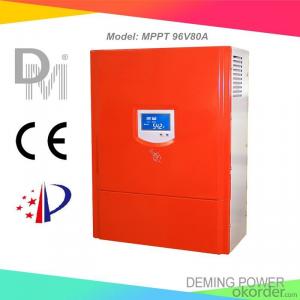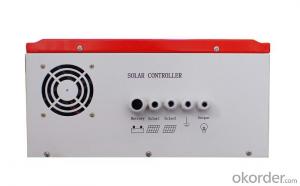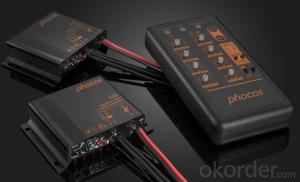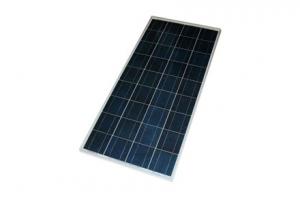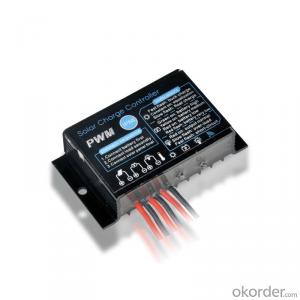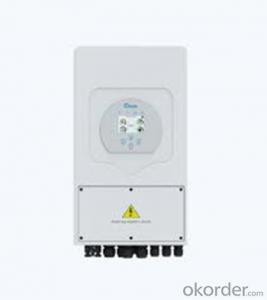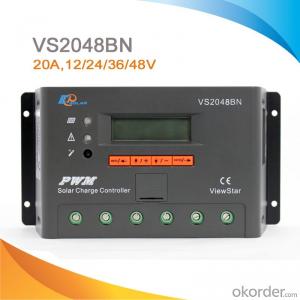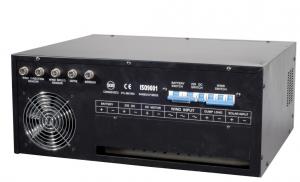MPPT Solar Charge Controller 96V 80A with best price for solar power system
- Loading Port:
- Qingdao
- Payment Terms:
- TT OR LC
- Min Order Qty:
- 1 PCS
- Supply Capability:
- 1000 PCS/month
OKorder Service Pledge
OKorder Financial Service
You Might Also Like
Properties of the solar charge controller
1. Design for off-grid solar power system.
2. Applicable to different kinds of batteries.
3. Adopts MPPT technology (Maximum Power Point Tracking). The advanced tracking algorithm make the solar module operate at ideal voltage which the solar modules can produce the maximum available power.
4. Modular design with simple structure and easy maintenance.
5. Automatic power control function.
6. LCD display: Solar panel current, solar panel voltage, solar panel power, battery group voltage, charge current.
7. Perfect protection function: Solar reverse charge protection, Solar reverse connection protection, Battery reverse connection protection, Battery overcharge protection, Battery over current protection etc ,thus the system has higher reliability.
Technical parameters of the solar charge controller
Model | 96V80A | |||||
Battery group rated voltage | 96Vdc | |||||
PV Rated current | 80A | |||||
PV open circuit voltage | 400V | |||||
PV Max. power | 7680Wp | |||||
Input PV module road number | 1 | |||||
Function | MPPT charge mode, auto stop charge, auto recharge voltage; Protection: connecting contrary, over current, short circuit, over heat etc. | |||||
Display mode | LCD | |||||
Display content | solar panel voltage, solar panel current, solar panel power, battery voltage, charge current | |||||
MPPT DC voltage range | 80-116Vdc | |||||
Floating Charge Voltage (adjustable) | 110Vdc | |||||
Stop charge voltage | 116Vdc±1% | |||||
Recharge voltage | 108V±1% | |||||
Voltage drop between PV and battery | 1.5V | |||||
Max itself power consumption | 100mA-150mA | |||||
Work environment temperature | -30-60°C | |||||
Relative humidity | 90% No condensation | |||||
Applicable altitude | 3000m The rated power should be reduced when it is higher than 2000m | |||||
Noise (1m) | 40dB | |||||
Degree of protection | IP20(Indoor) | |||||
Cooling method | Forced air cooling | |||||
*Communication interface (optional) | RS485/USB/GPRS/Ethernet | |||||
*Temperature compensation(optional) | -4mv/°C/2V,-35°C~+80°C,Accuracy:±1°C | |||||
Product size (mm) | 480*370*160mm | |||||
Product Weight(kg) | 12kg | |||||
*Above parameter only for reference. Could be custom made to user specifications.
- Q:How does a solar controller handle the protection of loads?
- A solar controller handles the protection of loads by monitoring the voltage and current coming from the solar panels and regulating it to ensure that the loads receive a stable and safe amount of power. It prevents overcharging of batteries by controlling the charging process and also protects the loads from excessive current that could damage or overload them.
- Q:Can a solar controller be used with a solar-powered desalination system?
- Yes, a solar controller can be used with a solar-powered desalination system. A solar controller is responsible for regulating and optimizing the charging process of solar panels, ensuring that the energy generated is efficiently utilized. In a solar-powered desalination system, the solar controller can be used to manage the input of solar energy, ensuring that the system operates at its optimal capacity and maximizing the production of fresh water from the seawater source.
- Q:Can a solar controller be used with solar panels of different technologies (monocrystalline, polycrystalline, thin-film)?
- Yes, a solar controller can be used with solar panels of different technologies such as monocrystalline, polycrystalline, and thin-film. The solar controller's primary function is to regulate the charging of the batteries and manage the flow of electricity from the solar panels. It does not depend on the specific technology of the solar panels, but rather on the voltage and current output of the panels. Therefore, as long as the solar panels are within the voltage and current range supported by the solar controller, they can be used together regardless of the technology.
- Q:What is the cost of a solar controller?
- The cost of a solar controller can vary depending on several factors such as brand, capacity, features, and quality. On average, a basic solar controller can range from $20 to $50, while more advanced models with additional functionalities can cost anywhere from $50 to $200 or more.
- Q:How does a solar controller handle shading or partial shading of solar panels?
- A solar controller handles shading or partial shading of solar panels by utilizing a technique called Maximum Power Point Tracking (MPPT). MPPT technology allows the controller to constantly monitor the voltage and current output of the solar panels and adjust the operating parameters to ensure they are always operating at their maximum power output, even when shaded. This helps to optimize the overall performance of the solar system and mitigate the impact of shading on energy generation.
- Q:Can a solar controller be used with a solar-powered university or college?
- Yes, a solar controller can be used with a solar-powered university or college. A solar controller is an essential component of a solar power system that regulates the voltage and current flow from the solar panels to the battery. It ensures the efficient and safe charging of the batteries, which are used to store the solar energy generated. Therefore, a solar controller is necessary to effectively manage and utilize the solar power in a university or college setting.
- Q:How does a solar controller handle variations in load power requirements?
- A solar controller handles variations in load power requirements by continuously monitoring the amount of power needed by the load and adjusting the flow of energy from the solar panels accordingly. When the load power requirement increases, the solar controller increases the flow of energy from the solar panels to meet the demand. This is usually achieved by increasing the duty cycle of the controller, allowing more energy to be transferred from the panels to the load. Conversely, when the load power requirement decreases, the solar controller reduces the flow of energy from the solar panels to avoid overcharging the batteries or wasting excess energy. It achieves this by decreasing the duty cycle, limiting the amount of energy transferred from the panels to the load. Solar controllers also employ various algorithms and control mechanisms to optimize the balance between energy generation and load consumption. These algorithms may include maximum power point tracking (MPPT) to ensure that the solar panels operate at their most efficient point, as well as voltage and current regulation to protect the batteries and load from potential damage. Overall, a solar controller plays a crucial role in managing the power flow between solar panels and the load, ensuring that variations in load power requirements are handled efficiently and effectively.
- Q:Can a solar controller be used with solar panel monitoring systems?
- Yes, a solar controller can be used with solar panel monitoring systems. A solar controller ensures the optimal charging and protection of the batteries connected to the solar panel system. It regulates the flow of electricity from the panels to the batteries, preventing overcharging and damage. By incorporating a solar controller into the system, the performance and efficiency of the solar panel monitoring system can be enhanced, providing accurate and reliable data on solar panel output and performance.
- Q:Can a solar controller be used with a solar electric vehicle charging station?
- Yes, a solar controller can be used with a solar electric vehicle charging station. A solar controller helps regulate the flow of electricity from the solar panels to the charging station, ensuring optimal charging efficiency and protecting the batteries of the electric vehicle.
- Q:Can a solar controller be used with a solar-powered boat or marine system?
- Yes, a solar controller can be used with a solar-powered boat or marine system. A solar controller is essential for regulating the flow of energy from the solar panels to the batteries in order to prevent overcharging and optimize charging efficiency. This ensures that the solar-powered boat or marine system operates smoothly and efficiently, maximizing the usage of solar energy.
1. Manufacturer Overview |
|
|---|---|
| Location | |
| Year Established | |
| Annual Output Value | |
| Main Markets | |
| Company Certifications | |
2. Manufacturer Certificates |
|
|---|---|
| a) Certification Name | |
| Range | |
| Reference | |
| Validity Period | |
3. Manufacturer Capability |
|
|---|---|
| a)Trade Capacity | |
| Nearest Port | |
| Export Percentage | |
| No.of Employees in Trade Department | |
| Language Spoken: | |
| b)Factory Information | |
| Factory Size: | |
| No. of Production Lines | |
| Contract Manufacturing | |
| Product Price Range | |
Send your message to us
MPPT Solar Charge Controller 96V 80A with best price for solar power system
- Loading Port:
- Qingdao
- Payment Terms:
- TT OR LC
- Min Order Qty:
- 1 PCS
- Supply Capability:
- 1000 PCS/month
OKorder Service Pledge
OKorder Financial Service
Similar products
New products
Hot products
Hot Searches
Related keywords
